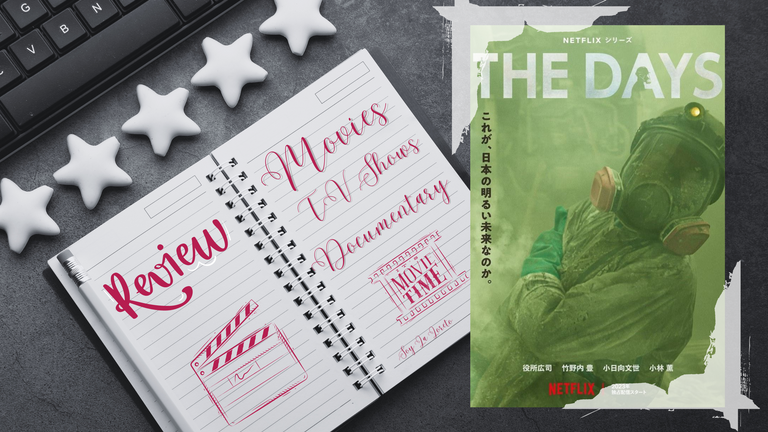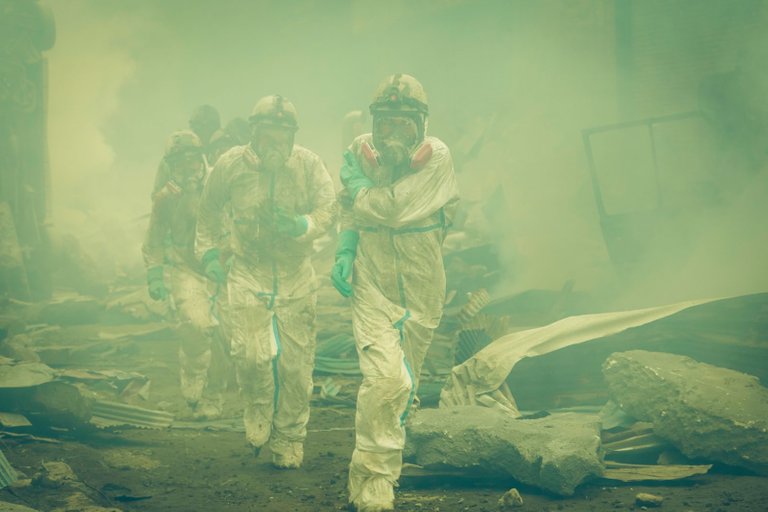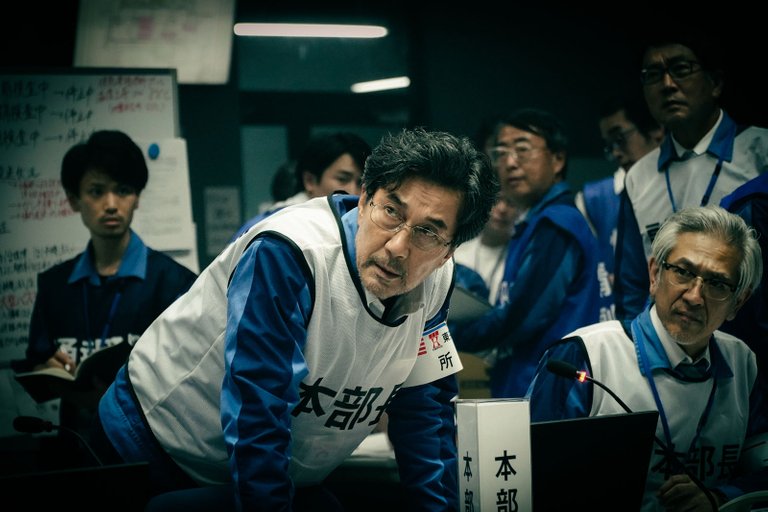The Days: Fukushima's last days | Review
When we hear "Nuclear Disaster" we immediately go to Chernobyl and if we combine it with the name "Japan" we go to Hiroshima. But no, what I bring you today has nothing to do with these locations, but they do have a lot to do with each other. I want to review for you the review of an amazing Japanese miniseries that I had the fortune to watch through Netflix: The Days.
! [SPANISH version]
Cuando escuchamos “Desastre Nuclear” nos vamos inmediatamente a Chernobyl y si eso lo unimos con el nombre de “Japón” nos vamos a Hiroshima. Pero no, lo que les traigo hoy no tiene que ver con estás localidades, pero sí que tienen bastante relación. Quiero reseñar para ustedes la reseña de una miniserie japonesa increíble que tuve la fortuna de ver a través de Netflix: The Days.


The Days, tells the story based on real events of the March 11, 2011 event at the Fukushima electric central; a nuclear power plant that failed after a Tsunami that initiated a level 7 catastrophe, the same level as Chernobyl. The miniseries recounts the events from the moment of the earthquake and how, as the hours passed, the risk of explosion and radiation increased in a large part of Japan, as well as electrical deficiency.
This is a miniseries from this year and is based on the book On the Brink: The Inside Story of Fukushima Daiichi, written by journalist Ryûshô Kadota, which features the direction of prominent Japanese director Masaki Nishiura and Hideo Nakata (The Hoop). There are some technical aspects that I could mention, such as the thread of some historical data, that as soon as they insert them it seems that they cut from a completely different series and embedded them anywhere they could, as well as a voice-over that comes out only in the final chapter, and that if they had decided to add it from the beginning it would have given a greater impact to the whole series. I really liked how the whole setting of the place seemed as if the radiation could be felt. The disaster sequences resulting from the Tsunami in the first episode is wonderful, it was the reason I stayed hooked to the end of the series.
It is necessary to mention that there were slow moments in the series, and that there were elements that concluded quite strange, such as the case of the two workers who were locked up during the Tsunami, which it was noticed that there was a modification because it was necessary to give a conclusion to that story. This is actually something that was quite noticeable and although I am not used to talk about technical details of this type in series or movies that I review, believe me I always take it into account.
! [SPANISH version] The Days, cuenta la historia basada en hechos reales de como aconteció el suceso del 11 de marzo de 2011 en la Central Eléctrica Fukushima; una central nuclear que falló luego de un Tsunami que inició una catástrofe de nivel 7, el mismo nivel que Chernobyl. En la miniserie cuentan los sucesos desde el momento del terremoto y como, a medida que iban pasando las horas, se iba incrementando el riesgo de explosión y radiación en gran parte de Japón, así como también, deficiencia eléctrica.
Esta es una miniserie de este año y se basa en el libro On the Brink: The Inside Story of Fukushima Daiichi, escrito por el periodista Ryûshô Kadota, que cuenta con la dirección del prominente director Japonés Masaki Nishiura y Hideo Nakata (El Aro). Hay algunos aspectos técnicos que podría mencionar, como el hilo de unos datos históricos, que en cuanto los insertan pareciera que recortaron de una serie completamente distinta y los incrustaron en cualquier lugar que consiguieron, así como una voz en off que sale solo en el capítulo final, y que si hubieran decidido agregarla desde el principio le habría dado un mayor impacto a toda la serie. Me gustó mucho como toda la ambientación del lugar parecía como si la radiación se pudiera palpar. Las secuencias del desastre resultado del Tsunami en el primer capítulo es maravilloso, fue la razón por la que me la mantuve hasta el final enganchada con la serie.
Es necesario mencionar que hubo momentos lentos en la serie, y que hubo elementos que concluyeron bastante raros, como el caso de los dos trabajadores que quedaron encerrados durante el Tsunami, los cuales se notó que hubo una modificación porque faltaba darle una conclusión a esa historia. Esto que les cuento, en realidad es algo que fue lo bastante notorio y aunque no acostumbro a hablar de los detalles técnicos de este tipo en series o películas que reseño, créanme que siempre lo tomo en cuenta.


I will now delve into the overall story and the reason why the producers decided to bring the series. The first thing I must warn you is that if you haven't seen Chernobyl yet, you should run to see it right now, it is an HBO miniseries that is incredible and before watching this one I bring you today, you should watch the other one just to put you in the historical context. It is impossible not to compare, because when talking about nuclear disasters we always go to the Ukrainian station. The most incredible thing is that only 12 years have passed since this disaster in Japan, and although the reasons why both exploded are very different, there are things that will never change.
We have always seen Japan as the ultimate power, as the ultimate beings, excellent in everything they do. So when I started watching the series I just said to myself: what bad luck they had, because of something natural, like an earthquake triggering what happened, it was just bad luck. But then you start to realize that nobody is perfect, and that there were a lot of terrible decisions that made the disaster happen in the end. Bad management, safety was not optimal, there were people at the top who had no idea what they were supposed to do because they had never been presented with something like this (obviously) and the background they had is not the most accurate (Chernobyl is not the place with the best reports in history). In addition, there were many other things, politics and diplomacy, for example, a president who, instead of being more concerned about his citizens, was more concerned that the rest of the world did not see them as the next Chernobyl. Bureaucracy, that slowness to make decisions that made everything go from bad to worse, was another reason for the great disaster to come. A formula for the inevitable, the explosion of one of the reactors, and an area that must still take 40 more years to be habitable.
! [SPANISH version] Ahondaré ahora en la historia general y la razón por la que los productores decidieron traer la serie. Lo primero que debo advertir es que si aún no han visto Chernobyl, deben correr a verla en este momento, es una miniserie de HBO que es increíble y antes de ver esta que les traigo hoy, deberían ver la otra solo para ponerlos en el contexto histórico. Es imposible no comparar, porque al hablar de desastres nucleares siempre nos vamos a las estación ucraniana. Lo más increíble es que solo han pasado 12 años desde este desastre en Japón, y aunque las razones por las cuales explotaron ambas, son muy diferente, hay cosas que no cambiarán nunca.
Siempre hemos visto a Japón como la máxima potencia, como unos seres máximos excelentes en todo lo que hacen. Así que cuando empecé a ver la serie solo me dije: qué mala suerte tuvieron, por culpa de algo natural, como lo es que un terremoto desencadene lo que pasó, fue solo mala fortuna. Pero luego empiezas a darte cuenta de que nadie es perfecto, y que hubo muchas decisiones terribles que hicieron que al final el desastre ocurriera. Mala gestión, la seguridad no era óptima, había personas en los altos mandos que no tenían ni idea de que era lo que debían hacer porque nunca se les había presentado algo así (obviamente) y los antecedentes que tenían no son los más exactos (Chernobyl no es el lugar con los mejores reportes de la historia). Además, había muchas otras cosas, la política y la diplomacia, por ejemplo, un presidente que, en vez de preocuparse más por sus ciudadanos, estaba más preocupado porque el resto del mundo no los viera como el próximo Chernobyl. La burocracia, esa lentitud para tomar decisiones que hizo que todo fuera de mal en peor, fue otra razón para el gran desastre que venía. Una fórmula para lo inevitable, la explosión de uno de los reactores, y una zona que debe pasar aún 40 años más para que sea habitable.


How does this happen? The desire to grow economically, to make Japan what it is today was the cause, they needed “clean energy” and powerful, and a nuclear reactor could give it to them, but the cost was higher. Fukushima is a ghost town, thousands of people died and thousands more lost their homes. In the end, the earth asks for what is its own, the place where the plant was located, by the sea, was the reason it happened. The Japanese are the creators of the word "Tsunami", how could they not foresee what could happen by locating something as dangerous as a nuclear reactor? A big doubt...
Something that I must emphasize and present my admiration for is the sense of responsibility of the workers of the plant. They were all fighting to go and die, because if they had to do something to avoid the explosion, they knew that sooner rather than later they would have an imminent death because of the radiation. And I admired the older people, who tried to safeguard the younger ones because they knew they were the only ones who could restore the mess they left behind. The responsibility was not left to them alone, they did not blame each other, but took responsibility for the disaster, because in reality, they were all to blame. The miniseries would not be complete if it were not for the workers' reports, and reports made to them. Nothing was hidden, everything came to light so that history would not repeat itself. And the reactors, to this day, are still being dismantled.
! [SPANISH version] ¿Cómo sucede esto? Las ansias de crecer económicamente, hacer a Japón lo que es hoy fue la causa, necesitaban “energía limpia” y poderosa, y un reactor nuclear se los podía dar, pero el costo fue más alto. Fukushima es una ciudad fantasma, miles de personas murieron y otros miles perdieron sus hogares. Al final, la tierra pide lo que es suyo, el lugar en el que estaba ubicada la central, a la orilla del mar, fue la razón por la que pasara. Los japoneses son los creadores de la palabra “Tsunami”, ¿Cómo no podían preveer lo que podía pasar al ubicar algo tan peligroso como lo es un reactor nuclear? Una gran duda…
Algo que si debo resaltar y presentar mi admiración es por el sentido de responsabilidad de los trabajadores de la planta. Se peleaban por ir todos a morir, porque si tenían que hacer algo por evitar la explosión, sabrían que más temprano que tarde tendrían una muerte inminente a causa de la radiación. Y admiración me daba hacia las personas mayores, que intentaban salvaguardar a los más jóvenes porque sabían que eran los únicos que pueden restaurar el desastre que dejaban. La responsabilidad no quedaba solo para ellos, no se culparon los unos a los otros, sino que se hicieron cargo de la responsabilidad del desastre, porque en realidad, todos tenían la culpa. La miniserie no estaría completa si no fuera por los reportes de los trabajadores, y reportajes hechos a ellos. Nada se ocultó, todo salió a la luz para que la historia no se repita. Y los reactores, al día de hoy, siguen siendo desmantelados.


Whatever it is, the reason these kinds of accidents happen is that we have ambition for more, and what we leave the planet with is destruction. The truth is that since the industrial revolution, ecological wear and tear has gone from bad to worse. I wish we could see how the planet bleeds because of us.
I highly recommend this miniseries. Although I talked about some technical details, it is not something that prevents us from enjoying it. There are fantastic moments that keep us in total tension throughout the 8 chapters it lasts. The actors are magnificent, and you get to feel a deep respect for some memorable ones. What pleased me the most is that it is a Japanese production, told and acted by Japanese people. Fortunately, it was not taken by Hollywood to make a story of their own with them as the heroes. If you have nothing to do today, you can start watching The Days.
! [SPANISH version] Sea lo que fuere, la razón por las que ocurren este tipo de accidentes es por tener ambición de más, y lo que le dejamos al planeta es destrucción. La verdad es que desde la revolución industrial, el desgaste ecológico ha ido de mal en peor. Ojalá pudiéramos ver cómo sangra el planeta por causa nuestra.
Recomiendo ampliamente esta miniserie. Aunque hablé de algunos detalles técnicos, no es algo que impida disfrutar de ella. Hay momentos fantásticos que nos mantienen en total tensión a lo largo de los 8 capítulos que dura. Los actores son magníficos y llegas a sentir un profundo respetos por algunos memorables. Lo que más me agradó es que es una producción japonesa, contada y actuada por japoneses. Por fortuna, no la tomó Hollywood para hacer una historia suya donde salieran ellos como los héroes. Si no tienen nada que hacer hoy domingo, pueden empezar a ver The Days.

Vi Chernobyl y me pareció una producción espectacular. También leí buenas criticas y recomendaciones sobre The Days, así que la tengo en mi lista para ver en cuanto termine con las que estoy ahora. Leer tu reseña me sirvió para entender un poco más del contesto y sobre lo qué esperar, me alegra que la recomiendes.
Bueno, espero verla pronto. Saludos.
Buenísimo, espero que puedas disfrutar de esta también. Gracias por comentar.
Hola, @soy-laloreto
Gracias por la reseña, la tengo en mi lista y ahora estoy entusiasmada para disfrutar del film. Vi Chenobyl, una serie en general excelente, en edición, fotografía y más, por esa razón sume esta propuesta basada en la vida real y las adaptaciones deben ser atractiva porque la mano del hombre construye para venerar acciones propias pero nunca ventilar los errores, así que, haré mis reflexiones al respecto.
Abrazos!
Si ya viste Chernobyl, vas a disfrutar está y poder comparar como manejaron las crisis las dos naciones, con un resultado similar, los japoneses al menos dab la cara por lo ocurrido y dejaron todo asentado para que no vuelva a ocurrir algo semejante.
Congratulations @soy-laloreto! You have completed the following achievement on the Hive blockchain And have been rewarded with New badge(s)
You can view your badges on your board and compare yourself to others in the Ranking
If you no longer want to receive notifications, reply to this comment with the word
STOPCheck out our last posts:
Me llama la atención y el tema es interesante. Tengo algo de nocion de la Central Eléctrica Fukushima por temas de energia renobable y el desmatelamiento de plantas en europa luego del desastre de 2011. Realmente la energia nuclear es la mas limpia, y podria cubrir la demanda mundial. Pero, hay un gran pero: lo riesgoso.
Esa frase del final me gustó: la naturaleza reclama... Potente.
Está muy buena esta serie, deberías verla. Hablan del desmantelamiento también, y todo el impacto causado.
ya esta en mi lista, desde hace meses quiero ver Chernobyl, pero creo que empezare con esta que es mas corta
Te recomiendo que veas Chernobyl primero, así entenderías el impacto de esta. Las dos tienen la misma duración, pero Chernobyl es más impactante y muuuucho mejor.
As of today I have not yet managed to see Chernobyl, and that is one of those that has caught my attention to see it, as it has totally interesting topics, although I know the subject about what happened, it is very interesting to see how they adapted this film, this series that you mention I will note it on my list too, it looks super good.